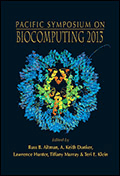The Future of Genome-Based Medicine
Quaid Morris1, Steven E. Brenner2, Jennifer Listgarten3, Oliver Stegle4
1University of Toronto;2Department of Plant & Microbial Biology, 111 Koshland Hall, University of California;3MICROSOFT RESEARCH;4MAX PLANCK INSTITUTES T‹BINGEN
Email: QUAID.MORRIS@UTORONTO.CA
Pacific Symposium on Biocomputing 18:456-458(2013)

Abstract
There has been unprecedented public investment in sequencing human and cancer genomes in the hopes of understanding disease [1, 2]. At the same time, large genome-wide association studies have helped elucidating the genetic underpinning of common diseases, identifying thousands of putative disease relevant loci [7, 8]. Complementary molecular profiling studies have revealed that several of these loci are co-associated with individual mRNA levels, suggesting candidate pathways that are putative mediators of genetic signals [7]. Coupled with the public investment, there is considerable personal investment in genetic profiling, being offered by companies such as 23andMe, deCODEme and others. Although this work has led to amazing discoveries, such as the surprising genetic, subclonal diversity within tumor populations (e.g., [3-5]), itís not clear how much how these insights will improve personalization of medicine.
[Full-Text PDF] [PSB Home Page]